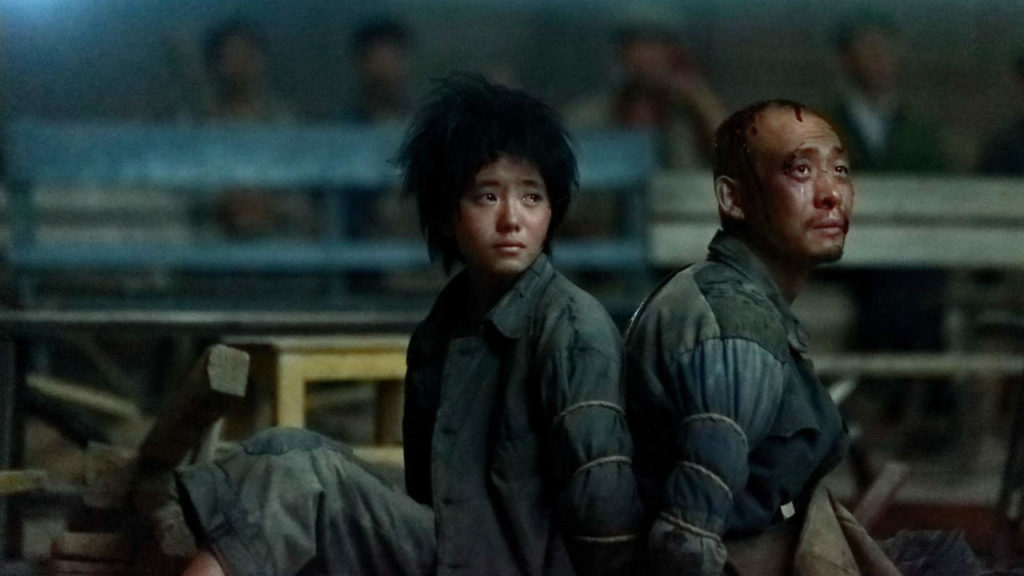
| China, 2020 | Author Work | Drama | Trailer |
I have been writing texts like this here ever since a year and a half. I consider myself a cinema enjoyer ever since 2012, regardless of the mild curiosity about it I may had had at my child/teen years. To me, and all of you know it, my dear readers, cinema is a major angular stone in life. But, without any other further consideration, life may suddenly decide delivering one of its famous slaps; and it may happen that I even could forget how much this medium means to me, overshadowed by smokey, joy-consuming miseries.
Luckily, there exist other people in this cruel world that at some point have felt the same as me, and could fight that kind of ennui with powerful testimonies of which balsamic effects cinema can produce in one’s soul. One Second talks about this. And I left the screening with a big smile of satisfaction in my lips.
This movie feels very much like a short tale: it’s simple in plot, it represents a closed and limited frame of action, the characters have no names (there is no need for that here either, to be honest), and it encloses a powerful message within its simplicity. The place is a remote settlement in the Chinese Northwestern desert during the times of the Cultural Revolution, where misery is the daily bread and news and entertainment are sparse and valuable. The settlers await the delivery of film reels from the central government with more excitement than New Year’s celebration. The few hours long gathering at the city hall to consume the delivered news program and movie are the beacon of their lives, and therefore the projectionist, “Mr. Movies”, is the most respected individual of their microcosmos. This is the power of cinema among people during times of sparsity.
In these circumstances, the main character appears, walking through the dunes to reach the settlements lost between dunes. Nobody knows him, neither his deeds, but he also wants to watch the movie the government is delivering. His reasons are totally different though. His daughter appears for a short second in one of the reels, as a part of the news program. In order to witness this second, this very ephimerous moment, he is ready to do anything.
One Second, most probably, acts as a powerful memento of the own childhood experiences of its director, world-acclaimed Zhang Yimou. For sure, going to the movies was an act of emblematic importance to him back then. Perhaps these were some of the only times he could be able to forget life and let his imagination soar. Probably, this was also one of the main reasons for him to pursue a cinematographic career. With One Second, he pays respect to one of the biggest entertainment and liberating means of all times.
Nevertheless, if you permit me entering a more philosophical field, we could state that any experience is subjective, depending on the life circumstances of the person that lives it. In this movie, the significance of cinema is broadened to the definition of different individuals. To the main mob, it’s entertainment and liberation. To “Mr. Movies”, it’s his raison d’être and the basis for his privileges. To the main character, even one single second of the screening is enough reason to risk his whole life. Because a movie is not only entertainment, it is also a reflection of reality. When the lights of reality shape the running celluloid, a part of our world gets frozen, –immortalised– within. If we are not able to risk everything to preserve and cherish these tiny bits that conform our world and small bits of happiness, our existance, the whole human heritage, then we better might be dead.
In spite of the depth of its message and its heavy charge, One Second is a true feel-good movie. Its soft nonchalantness acts like a speck of pure shine among our daily miseries. On the other side, its light bittersweet ending acts like a speck of misery, a remembrance of life’s unfairness, within its light. I can’t imagine something more Chinese than this. There is always some dark in the light, and there will be always some light in the darkness. We just need to be able to remember that and find it.
Let cinema be the small light that breaks the thick blackness of the screening room of our lives.